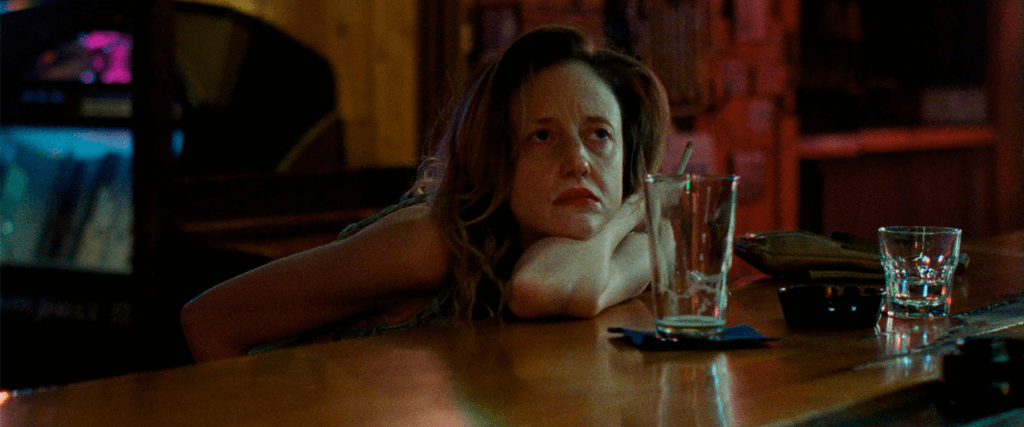Reader's Choice

To Leslie
By Brian Eggert |
To Leslie plays like a country song made flesh. If its protagonist had a dog, the animal would die. If she had a pickup truck, it would break down. Leslie, played by Andrea Riseborough in a terrific performance, won $190,000 in the lottery six years ago. But now she’s broke, busted, down and out, and homeless. Her story isn’t as uncommon as you might think. CNBC reports that many lottery winners file for bankruptcy within three to five years after winning. In Leslie’s case, she spent her money until nothing was left. She wasted much of her winnings on drugs and booze, and she burned every bridge in the process. Later in the film, at her lowest point, she finds herself in a bar, listening to Willie Nelson singing pointed lyrics to “Are You Sure” in his experienced voice: “Look around you, look down the bar from you, at the faces that you see. Are you sure this is where you want to be?” He could have written the song about her. Or perhaps Ryan Binaco, who based the story on his mother, was inspired by the Nelson tune. The similarities might be unbearably close, except Leslie openly recognizes herself in Nelson’s song and can only laugh.
A classically trained British performer who has spent much of her career in independents, Riseborough disappears into this working-class woman from a small West Texas town, giving another in a long line of chameleonlike performances—see Disconnect (2012), Mandy (2018), Possessor (2020). Leslie, nicknamed Lee, is a character who gradually goes from a deluded and hostile mess to someone who wants to change. But it’s a long-suffering, miserabilist journey before we see any sign of Lee’s desire to improve. In the meantime, there’s nothing worse than enduring the reckless and harmful behavior of a sloppy drunk with a temper. Over the course of To Leslie’s plodding two-hour runtime, it forces us to watch her self-destructive behavior until, finally, she shows evidence of real change. Even so, Riseborough pulls off something miraculous and redeems an initially despicable character, even though Binaco’s script limits much of her redemption to the last half hour.
Episodic television veteran Michael Morris (Better Call Saul, Billions, Halt and Catch Fire, etc.) makes his feature film debut with this microbudget production that premiered at South by Southwest and later received a limited theatrical release. It has become notable during the awards season for Riseborough’s unexpected Oscar nomination for Best Actress (more on that later). Morris directs like he’s making a work of 1970s gritty realism with a hint of downtrodden poetry, akin to Five Easy Pieces (1970) or the work of John Cassavetes. Shot on 35mm by cinematographer Larkin Seiple, the film even looks of the period. The characters drive rundown vehicles, smartphones rarely appear onscreen, and a VHS tape plays a key role. And aside from some allusions to WiFi, one might suspect To Leslie is a period piece set 30 years ago. But, instead, it’s a stripped-down drama set to the tune of Dolly Parton, Waylon Jennings, and George Jones.
 The film opens with a montage of photographs of Lee’s early life, followed by news footage of her hootin’ reaction to her lottery win, complete with a declaration that money will bring her “a better life.” But after half a decade, she’s kicked out of the motel she has been living in and asks her estranged son James (Owen Teague), whom she abandoned years earlier, to rescue her. When she proves unreliable at best, James sends her to stay with some former friends, the sympathetic Dutch (Stephen Root) and the hardened, resentful, and downright mean Nancy (Allison Janney, cutting). But Lee doesn’t do much to earn anyone’s trust, and when she betrays whatever confidence she’s gained, she selfishly defends herself: “What about me?” It’s not until a lowly motel manager, Sweeney (Marc Maron), takes pity on Lee that she eventually begins to earn the audience’s sympathy. He gives her a job and, despite reservations from the motel’s mind-fried owner Royal (Andre Royo), second, third, and fourth chances. Lee and Sweeney share tender, funny moments, such as a TV dinner scene set to “Hare Krishna” and several scenes showing his patience and care as Lee quits drinking cold turkey, building a natural romance.
The film opens with a montage of photographs of Lee’s early life, followed by news footage of her hootin’ reaction to her lottery win, complete with a declaration that money will bring her “a better life.” But after half a decade, she’s kicked out of the motel she has been living in and asks her estranged son James (Owen Teague), whom she abandoned years earlier, to rescue her. When she proves unreliable at best, James sends her to stay with some former friends, the sympathetic Dutch (Stephen Root) and the hardened, resentful, and downright mean Nancy (Allison Janney, cutting). But Lee doesn’t do much to earn anyone’s trust, and when she betrays whatever confidence she’s gained, she selfishly defends herself: “What about me?” It’s not until a lowly motel manager, Sweeney (Marc Maron), takes pity on Lee that she eventually begins to earn the audience’s sympathy. He gives her a job and, despite reservations from the motel’s mind-fried owner Royal (Andre Royo), second, third, and fourth chances. Lee and Sweeney share tender, funny moments, such as a TV dinner scene set to “Hare Krishna” and several scenes showing his patience and care as Lee quits drinking cold turkey, building a natural romance.
To Leslie came and went last fall without making much of a splash. Ever since, much of the conversation around the film has centered around Riseborough’s so-called grassroots strategy of relying on the social media influence of celebrity friends to earn an Oscar nomination. The whole issue, which I will not explore in detail here, only speaks to the hollowness and arbitrariness of awards season—how it’s rarely about honoring the best in each category but how well you can campaign for your award. The notion that Riseborough would give such a selfless performance here and then put so much effort into getting an award for it smacks of vanity and privilege—but that’s true of the Academy Award phenomenon. While Riseborough gives a committed performance that’s admirable and no doubt a contender, Maron exudes humanity, and Janney is fierce in her character’s contempt of Lee, calling her “rode hard and hung up wet” in a memorable jab. Both Maron and Janney should have campaigned, too.
If the final resolution arrives impossibly fast, with much of the work glossed over in a late leap forward in time, To Leslie sets up the circumstances that allow Lee to finally commit to working on herself. Morris’ direction is assured and unassuming, but Binaco’s script treats each dramatic turn like another verse in a country song. Stepping back, the viewer can see the musical structure at work, and while it’s not always convincing or pleasant, the narrative makes emotional sense—as music should. However, more than its themes about hard-earned redemption, watching To Leslie is one of those films where the story feels recessive next to the performances on display. The actors use big, twangy accents and, aside from Riseborough, never disappear into their roles. Even so, they’re performed with the pathos and talent that makes the movie admirable despite itself.
(Note: This review was originally suggested on and posted to Patreon on February 7, 2023.)

Unlock More from Deep Focus Review
To keep Deep Focus Review independent, I rely on the generous support of readers like you. By joining our Patreon community or making a one-time donation, you’ll help cover site maintenance and research materials so I can focus on creating more movie reviews and critical analysis. Patrons receive early access to reviews and essays, plus a closer connection to a community of fellow film lovers. If you value my work, please consider supporting DFR on Patreon or show your support in other ways.
Thank you for your readership!
Brian Eggert | Critic, Founder
Deep Focus Review







